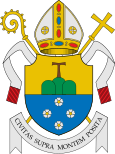Roman Catholic Diocese of Cubao
Diocese of Cubao Dioecesis Cubaoensis
| |
|---|---|
| Catholic | |
 Interior of Immaculate Conception Cathedral of Cubao | |
 Coat of arms with the motto Civitas Supra Montem Posita ("A City Set on a Hill") | |
| Location | |
| Country | |
| Territory | Quezon City
|
| Ecclesiastical province | Manila |
| Metropolitan | Manila |
| Statistics | |
| Area | 76 km2 (29 sq mi) |
| Population - Total - Catholics | (as of 2021) 1,836,483 1,468,829[1] (80%) |
| Parishes | 46 parishes, 1 non-parochial shrine |
| Information | |
| Denomination | Catholic |
| Sui iuris church | Latin Church |
| Rite | Roman Rite |
| Established | June 28, 2003 |
| Cathedral | Immaculate Conception Cathedral of Cubao |
| Patroness | Immaculate Conception |
| Secular priests | 63 |
| Current leadership | |
| Pope | Francis |
| Bishop | Honesto Flores Ongtioco |
| Metropolitan Archbishop | Jose Advincula |
| Vicar General | Steven C. Zabala |
| Website | |
| https://dioceseofcubao.ph | |
The Roman Catholic Diocese of Cubao (Latin: Dioecesis Cubaoensis) is a diocese of the western Latin Church of the Catholic Church in district of Cubao in Quezon City, in northern Metro Manila, Philippines. The diocese was created by Pope John Paul II on June 28, 2003[2] from the ecclesiastical district of Cubao of the Roman Catholic Archdiocese of Manila. It was canonically erected on August 28, 2003, with the installation of Honesto Flores Ongtioco as the first Bishop of Cubao. The Blessed Virgin Mary, under the title Immaculate Conception, is the principal patroness of the diocese.
The diocese is composed of 45 full parishes including three national shrines, two minor basilicas; two quasi-parishes; one non-parochial diocesan shrine; and one mission station. These are clustered into six separate vicariates.
History
[edit]On December 3, 1974, Manila Archbishop Jaime Sin divided Quezon City into four vicariates: the Vicariates of Santa Rita, of Holy Family, of Saint Joseph, and of Santo Nino.
On August 10, 1987, the ecclesiastical district of Quezon City was divided into two: Quezon City-North and Quezon City-South. On March 15, 2002, the district's territories were revised and the southern district renamed the ecclesiastical district of Cubao. Manila Auxiliary Bishop Socrates Villegas became the district bishop with Monsignor Daniel Santa Maria as its episcopal vicar.
On June 28, 2003, Pope John Paul II signed the papal bull Quo Satius Provideretur and the district was made a diocese, along with the Roman Catholic Diocese of Kalookan and Roman Catholic Diocese of Pasig. Honesto F. Ongtioco, Bishop of the Roman Catholic Diocese of Balanga, was named its first bishop and was formally installed on August 28, 2003. The Immaculate Conception Parish at 39 Lantana Street, Barangay Immaculate Conception, Cubao, Quezon City, became the Cubao Cathedral and seat of the diocese.
Territorial jurisdiction
[edit]The diocese comprises the southern part of Quezon City, starting from Tandang Sora Avenue and Mactan Street leading throughout the south of the city, particularly the three legislative districts of the city in the south: District 1 (all barangays), District 3 (except Barangays Camp Aguinaldo, Matandang Balara and EDSA Shrine in Brgy. Ugong Norte along EDSA-Ortigas), and District 4 (except the lower part of Barangay Bagong Lipunan ng Crame). In addition to, it comprises some barangays in District 6, namely Sangandaan, Baesa, Apolonio Samson, Unang Sigaw, Balon-bato (or Balumbato), New Era, and portions of Culiat and Tandang Sora that are found on the southern portion across Tandang Sora Avenue. Two properties owned and operated by the Archdiocese of Manila which are Radio Veritas 846 abd Our Lady of Veritas Chapel, and headquarters of media companies and broadcasting networks ABS-CBN (ABS-CBN Broadcasting Center) and GMA Network (GMA Network Center) are located within the diocese's jurisdiction.[3]
Camp Aguinaldo and the portion of Camp Crame south of Bonny Serrano Avenue, with Veterans Memorial Medical Center along North Avenue, Project 6, are under the jurisdiction of the Military Ordinariate of the Philippines, whereas Barangay Matandang Balara and EDSA Shrine are under the Diocese of Novaliches and Archdiocese of Manila, respectively.
Ordinaries
[edit]| Order | Image | Episcopate | Name | Place of birth | Age at start/end of episcopacy | Notes | Coat of arms |
|---|---|---|---|---|---|---|---|
| 1 | 
|
August 28, 2003 – present (20 years, 357 days) |
Honesto Flores Ongtioco | San Fernando, Pampanga | 54 / — | First bishop of the Diocese of Cubao, also the apostolic administrator of the Diocese of Malolos following the death of its Bishop Jose F. Oliveros.[4] | 
|
Arms
[edit]
|
See also
[edit]- Catholic Church in the Philippines
- Parish of the Holy Sacrifice
- Sacred Heart Parish Kamuning
- Santuario de San Pedro Bautista
- Our Lady of La Naval de Manila
References
[edit]- ^ "Cubao (Catholic Diocese)". gcatholic.org. Retrieved September 16, 2023.
- ^ "Quo Satius Provideretur" (in Latin). Libreria Editrice Vaticana. June 28, 2003. Retrieved June 16, 2018.
- ^ "Story of EDSA Shrine | EDSA Shrine". www.edsashrine.com. Archived from the original on December 16, 2013.
- ^ "MOST REV. HONESTO F. ONGTIOCO, D.D." www.cbcponline.net. Archived from the original on January 9, 2004.

